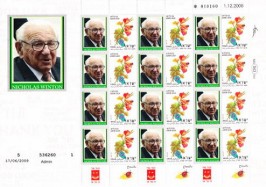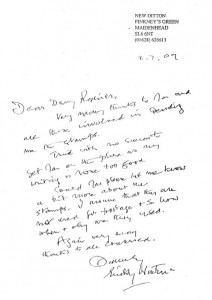Sir Nicholas Winton arranged 8 trains to carry 669 children, mostly Jewish, from Czechoslovakia to Britain at the outbreak of World War II. The International Raoul Wallenberg Foundation celebrates the life of a savior
Video about the story of Sir Nicholas Winton
Nicholas Winton, an example of humanity
In December 1938, 29-year-old Winton was packing for a skiing holiday in Switzerland when his would-be holiday companion told him to come urgently to Czechoslovakia instead. Adolf Hitler’s forces had occupied the country’s Sudetenland, and Winton was appalled to see the conditions in which the refugees were living. In other parts of central Europe, ”kindertransporten” were already evacuating children, but Czechoslovakia had no such programme.
Winton immediately started raising money and organising trains to save the children, and on his return to Britain began finding homes and organising visas for them, all while holding down his day job in London. Word of Winton’s audacious plan quickly spread throughout Prague. When he returned to the Czech capital and set up office in his hotel room on Wenceslas Square, long queues soon formed outside of parents who would plead with him to take their children to Britain.
”Those parents were desperate – it was heartbreaking to listen to their stories,” Winton, now Sir Nicholas Winton, recalled in a 2007 interview. ”They knew all too well what their fate was likely to be. Their first thought was for the little ones. Never themselves. Practically all those parents perished in the camps.”
Between March and August 1939, eight Winton trains carried 669 children – most of them Jewish – to safety in Britain. Seventy years on, as the steam train whistled its impending departure, they recalled parents telling them that they were just going on a short holiday, the excitement of the older children and the bewilderment of the younger ones. They remembered their strange first impressions of Britain, spitting out a first sip of milky tea and their wonder at white sliced bread.
”Our parents put a brave face on things, and of course they didn’t know that they wouldn’t see their children again,” said Lady Milena Grenfell-Baines, who was sent to a family in Lancashire and still lives in Preston. ”It is very unreal and very emotional to be here today. It’s like a film set,” she said, as Czech government ministers prepared to unveil a statue to Sir Nicholas.
The former evacuees also remembered how a ninth train had been due to leave Prague on 1 September 1939 and how, after war broke out, the Nazis stopped it leaving the city. Most of the 250 children on board were never seen again. ”My brother was supposed to be on that train. He and my parents were all killed,” said Eve Leadbeater, who lives in Nottingham, where she was taken in by a teacher at the age of eight. ”Being in Prague again brings a whole mix of emotions: sadness at what happened and joy at being alive. What Nicholas Winton did was a great example of what one man with compassion and determination can do.”
The scale of Sir Nicholas’s achievements is almost matched by his reticence to discuss them. ”I was never really in danger,” he has said. ”I simply saw a need and I filled it. I wasn’t anyone special. I just saw what was going on and did what I could to help.”
He did not even tell his wife about his exploits until the late 1980s, when she found a scrapbook of clippings in the attic of their home in Maidenhead. The scrapbook was passed to a Jewish historian and, before long, he was being introduced to some of the people he had saved, on Esther Rantzen’s That’s Life.
Having previously been awarded only the Freedom of Maidenhead, Winton was now described as ”Britain’s Oscar Schindler” and the ”Pied Piper of Prague” and he was knighted in 2003. Four years later, the Czech Republic gave him its highest honour and nominated him for the Nobel Peace Prize.
After unveiling a statue of Winton with two children at Prague station, Barbara Winton said that her father was still an uncompromising man of action – even at 100 years old. ”What he did 70 years ago is totally in keeping with how he is now. He believes that, if something needs to be done, you must do it. Looking back doesn’t get people anywhere. But if this event makes people more aware of what we should be doing now, then he will see it as a good thing.”
International Raoul Wallenberg Foundation postal stamp
Sir Nicholas Winton’s letter addressed to the Wallenberg Foundation


